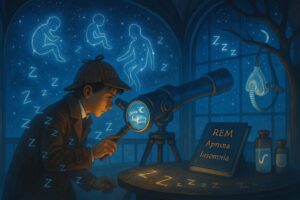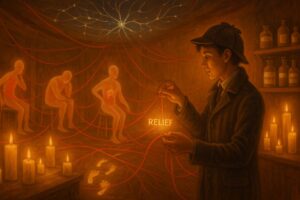
Psychiatry
- Posted by admin
- Categories Complex & Integrated Medicine
- Date May 23, 2025
- Comments 0 comment
The Mind Detective’s Domain - Cracking the Cases of Thought, Emotion, and the Inner World
1. Introduction: The Scene of the Specialty
Step into the shoes of a Psychiatry sleuth.
This is the theatre of the unseen—where thoughts wander, moods shift, and behaviour tells a deeper story. Psychiatric detectives don’t follow physical trails but emotional ones. They listen to language, patterns, absences, and contradictions, seeking meaning in what’s said—and what’s not. Welcome to a world where a whisper may be a warning, a delusion may contain truth, and healing often begins with being heard.
2. Key Mysteries They Solve (Common Conditions)
These detectives specialise in solving cases involving:
- Mood Disorders – depression, bipolar disorder, and the shifting sands of affect.
- Anxiety & Trauma – where fear becomes habit and past pain echoes into the present.
- Psychosis & Schizophrenia – unravelling disconnection from shared reality.
- Personality Disorders & Self-Harm – chronic puzzles of identity, coping, and relational pain.
Each case requires emotional fluency, structured curiosity, and deep clinical compassion.
3. Their Trusted Tools & Techniques
Every detective has their kit—and in Psychiatry, tools may include:
- The Psychiatric Interview – part clinical probe, part trust-building narrative exchange.
- Mental State Examination (MSE) – observing the surface to infer the storm beneath.
- Risk Assessments – for suicide, violence, self-neglect, or vulnerability.
- Therapeutic Modalities – including CBT, ACT, psychodynamic therapy, and pharmacological support.
Psychiatry is about finding patterns in paradox—and using words, presence, and medicine to reweave fractured minds.
4. The Charms of This Field: Why It Captivates the Curious
- Endless Complexity: No two minds are alike—every patient is a universe of meaning.
- Interdisciplinary Power: Medicine, psychology, sociology, and storytelling unite.
- Deep Impact: Helping someone rediscover safety, self-worth, or hope is transformative.
- Time and Relationship: Healing often unfolds across weeks, months, or years.
This is medicine of nuance, connection, and slow, significant shifts.
5. Challenges: The Toughest Cases They Face
- Stigma and Misunderstanding – From public, systems, and even within medicine.
- Emotional Exposure – Holding distress, trauma, and suicidal ideation with care.
- Risk vs Autonomy – Balancing safety with respect for personhood.
- Recovery Isn’t Linear – Setbacks are common; progress can feel invisible.
But the seasoned psychiatrist knows: recovery is possible—and every human story deserves a witness.
6. Famous Cases and Hallmark Clues
- The “Classic Presentation” – A withdrawn, flat-affect patient with auditory hallucinations: schizophrenia.
- The “Zebra” – Rapid-cycling mood, impulsivity, and unstable relationships: borderline personality disorder vs bipolar.
- The “Aha Moment” – Realising a patient’s chest pain and dizziness aren’t cardiac—but panic in disguise.
7. Your Training Trail: How to Join the Investigation
To become a Psychiatry detective:
- Start with medical training, then specialise in psychological theory, human behaviour, and risk management.
- Practise the art of deep listening—your interview is your greatest diagnostic tool.
- Learn psychopharmacology with precision, and psychological therapies with patience.
- Develop boundaries, empathy, and reflective practice—your mind is your tool, and must be cared for too.
Whether supporting a patient through psychosis, helping a teen out of despair, or navigating trauma’s legacy, you’ll be offering dignity where it’s been denied.
8. Final Words: The Signature of the Psychiatry Detective
Psychiatry detectives explore where biology meets biography.
They navigate dark corners of the mind, bringing light, language, and safety.
They hold space for pain—and become part of a person’s narrative of growth.
So if you’re drawn to the puzzle of identity, the weight of unspoken wounds, and the promise of repair—
then this is your calling, and your casework lies in hearts and minds.



